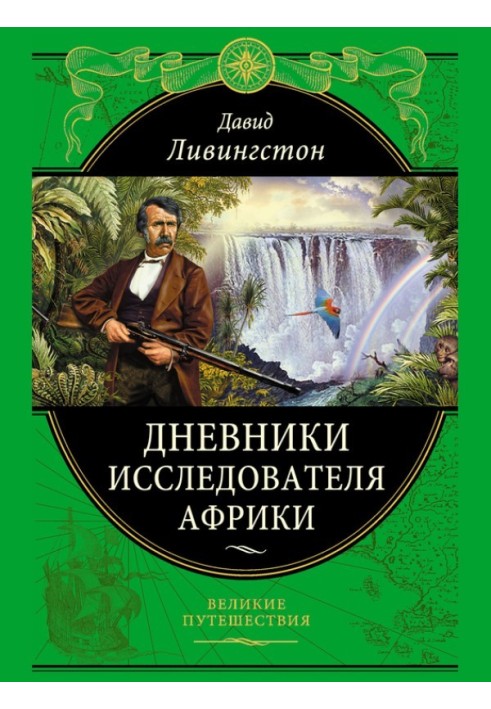Diaries of an African Explorer
 Instant download
Instant download
after payment (24/7)
 Wide range of formats
Wide range of formats
(for all gadgets)
 Full book
Full book
(including for Apple and Android)
When we pronounce the fabulous word Africa, we remember the glorious name of David Livingston (1813–1873) - a Scottish physician, Christian missionary and tireless traveler. In his famous manifesto of 1853, he defined his life credo as follows: “I will discover Africa or perish.” Both came true, and - alas! - another. In total, Livingston spent 32 years realizing his dream, that is, almost three quarters of his adult life. He traveled, mostly on foot, 50,000 (!) kilometers through the jungles and mountains of Central and South Africa, including making an unprecedented trans-African crossing from the Atlantic to the Indian Ocean, discovering the world's largest Victoria Falls, exploring the Zambezi Basin, searching for the sources of the Nile... When he disappeared in the wilds of the Dark Continent, they were equipped to search for him several expeditions at once. And when the successful American newspaperman Stanley found the sick Livingston, the whole world breathed a sigh of relief. And Henry Morton Stanley himself not only became famous for this “discovery,” but also became an outstanding explorer of Africa. “It is much easier to make a journey than to describe it.” Livingstone knew what he was talking about: in 1857 he published a book - Travels and Research of a Missionary in South Africa. It immediately sold 70,000 copies, occupying the same prominent place in the history of publishing as in the history of geographical discoveries. The great pioneer who crossed the Dark Continent from West to East, Livingston was, above all, an outstanding personality. He surpassed his contemporaries and colleagues in the same way that the Victoria Falls he discovered surpasses others waterfalls. Risking his life in the uncharted African wilds for almost a third of a century, he said it simply: “The best guarantee of safety is decent behavior.” Africans loved the “Great Lion” - as they called Livingston - because he understood them, respected them, and protected them from slave traders and never cheated. A renowned explorer of Africa and a tireless missionary, he brought the light and spirit of Christianity to where Christian slave traders had already brought darkness and despair. The leaders of local tribes befriended him and trusted him. He gave his heart to Africa - and therefore it was rightfully buried in Chitambo - where he died. And the embalmed body was brought to Great Britain and buried in Westminster Abbey almost a year after death. On his tombstone are carved the words: “Transferred by faithful hands across land and sea, here rests David Livingstone, missionary, traveler and friend of mankind.” At the same time, The Last Diaries of David Livingston were published. Even better than the books written during his lifetime, they convey the spirit of the era and the personality of the author, and even more fully describe the time and place - Africa of the 1860s - in all its tragic and contradictory splendor. The diary of Livingston's last journey is both a report on current events, and a detailed autobiography, and an afterword to a great destiny. The electronic publication of David Livingston's last diaries includes all the texts of the paper book and basic illustrative material. But for true connoisseurs of exclusive publications, we offer a gift classic book. The paper edition is richly designed: it contains more than 250 illustrations, including the rarest. The publication is printed on beautiful offset paper. In terms of the richness and variety of illustrative material, the books in the “Great Travels” gift series are not inferior to art albums. Editions of the series will adorn any, even the most sophisticated library, and will be a wonderful gift for both young readers and discerning bibliophiles.
Data sheet
- Name of the Author
- Давид Ливингстон
- Language
- Russian
Reviews
Неперевершене видання для любителів пригод і історії!
Книга "Щоденники дослідника Африки" - це не просто збірка щоденникових записів, а справжня подорож у часі, яка переносить читача в епоху великих відкриттів та досліджень. Давид Лівінгстон, якого ми знаємо як невтомного мандрівника та місіонера, відкриває перед нами захоплюючий світ Африки, її красу та небезпеки. Його щоденники сповнені емоцій, переживань та глибоких роздумів про людство, віру і природу. Книга не лише інформативна, але й надихає, показуючи, як одна людина може змінити світ, ризикуючи всім заради своїх ідеалів. Багато ілюстрацій, які супроводжують текст, роблять читання ще більш привабливим, адже вони відображають реалії того часу. Це видання стане справжньою окрасою будь-якої бібліотеки і чудовим подарунком для всіх, хто цінує історію, пригоди та дослідження. Рекомендую всім, хто хоче доторкнутися до величі людського духу!















